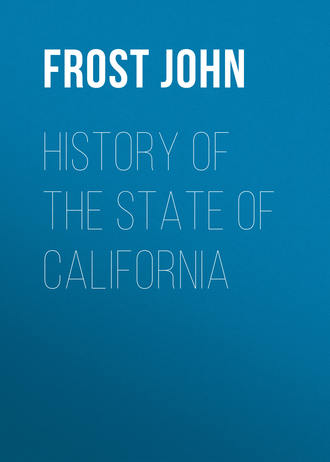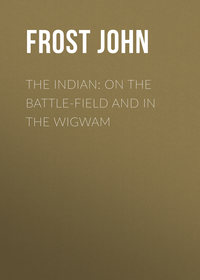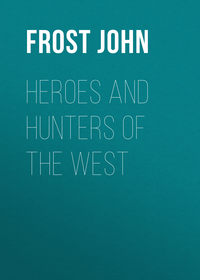
History of the State of California
The importance, however, of this port results mainly from its geographical position, and the influence it is likely to exert as a military and naval depot upon our commercial interests in the Pacific. The port of San Francisco, in Upper California, should be well fortified, and every care taken to make it a harbor of refuge for our merchant and military marine, in case of a maritime war; but it must be remembered that that place is nearly fifteen hundred miles from the nearest port of Mexico, and that it is very far north of some of the best whaling grounds in the Pacific, and too distant to afford much protection to our commerce with Central America, although its position gives it a controlling influence over the commerce of Sandwich Islands, Upper California, and Oregon. In the same way a well-fortified naval station at La Paz, from its immediate proximity to the coast of Mexico, would have a most beneficial influence on our commercial and whaling interest in this part of the Pacific. The great value, in time of maritime war, of such key points as La Paz, and the commanding influence exercised by them in the protection of commerce, have become settled principles in military defence; and England shows her appreciation of their truth, and the wisdom of her own policy, in establishing stations and points like St. Helena, Cape of Good Hope, Gibraltar, Malta, Corfu, and Bermuda.
Again, the growing commerce of California and Oregon, and the political importance of our possessions on the Pacific, render it necessary that we should have some means of rapid communication between them and the seat of government at Washington. This communication must be effected by the isthmus of Panama or of Tehuantepec. In either case steamers bound to Upper California and the Columbia River must have one or more intermediate depots of fuel; and in time of war it is important that these depots be established in our own rather than in a hostile territory. A glance at the map will show that La Paz is nearly equidistant from the extremities of this line; and that Tehuantepec, La Paz, and San Francisco divide into four equal parts the whole distance from Panama to Oregon. Moreover, as this ocean is peculiarly suited to steam navigation, a large part of the commerce of the Pacific must eventually be carried on in steam vessels; and in all probability not many years will elapse before a portion of our naval force in these waters is of the same character. Under this supposition, the importance of our possessing some naval depot and harbor of refuge and repair south of Upper California is too manifest to require argument or illustration.
But whatever may be thought of the value of this peninsula or of the gulf as a natural boundary between us and Mexico, instead of an imaginary line drawn from the Colorado to the Pacific, thus separating a kindred people, and exposing the governments of the two territories to continual collisions, the propriety of retaining Lower California is, in my opinion, now no longer an open question. When this country was first taken possession of by the forces of the United States, the people were promised the protection of our government against Mexico, and guarantied the rights secured by our Constitution; and in November, 1847, they were assured by the commander-in-chief of the Pacific squadron, (with the approbation of the Secretary of the Navy,) that this territory would be permanently retained by the American government; and again, by the President of the United States, in his annual message of December, 1847, that it "should never be given up to Mexico." Acting under these assurances, all the most respectable people of the territory not only refused to take part with the Mexican forces which were sent to attempt the recapture of that country from the Americans, but many of them actually took up arms in our defence, and rendered most valuable services in ridding the peninsula of the guerrilla hordes sent over from Mexico for the purpose of effecting our expulsion. In this conflict, some who thus sided with us lost their lives, many their property, and all have exposed themselves to the vengeance of the Mexican government. But these losses and dangers they have willingly encountered, in the hope of obtaining the better government of the United States. They have regarded these promises as made in good faith, and have been guided in their conduct by the assurances thus held out to them by the agents of the American government; and now, for the United States to voluntarily surrender this country to the republic of Mexico, and leave these Californians exposed to the loss of life and confiscation of property for having sided with us, under the assurances thus held out to them, would not only be in itself a breach of national faith, but would make us appear in the eyes of the world guilty of the most deliberate and cruel deception.
H. WAGER HALLECK,Lieutenant of Engineers.Colonel R. B. Mason,
Commanding Tenth Military Department.
1
A gold placera was discovered some years ago, near the mission of San Fernando, but it was very little worked, on account of the want of water.
2
Farnham's Adventures in California. – Wilkes's Narrative of the Exploring Expedition. – Fremont's Narrative.
3
See Farnham's Adventures. Wilkes's and Fremont's Narratives, and Emory's Report. – In 1846, Eugenio Macnamara, a Catholic priest and Missionary, obtained a grant of a large tract of land between the San Joaquin and the Sierra Nevada, the Cosumnes and the Tulares in the vicinity of San Gabriel, from Pio Pico, governor of the Californias, for the purpose of establishing upon it a large colony of Irish Catholics; but the grant was not ratified by the Central Government, and the project was not carried into effect. There is no evidence that Father Macnamara was aware of the existence of gold in the valley of the San Joaquin.
4
Official Despatch of Colonel Mason, Commander of the 10th Military Department, August 17, 1848. – Letters of Thomas C. Larkin, U.S. Consul at Monterey, to the Secretary of State, June 1, and June 28, 1848.
5
Feather River is the first considerable branch of the Sacramento below the Prairie Buttes. It has a course of about forty miles, and empties into the main river about fifteen miles above New Helvetia. Though the Sacramento is navigable for vessels only to that place, boats can pass up one hundred miles further.
6
Four Months Among the Gold Finders of California, by J. Tyrwhitt Brooks, M.D.
7
Personal Adventures in Upper and Lower California, by William Redmond Ryan.
8
Sights in the Gold Region, or Scenes by the Way, by Theodore T. Johnson.
9
Four Months Among the Gold Finders of California, by J. Tyrwhitt Brooks, M.D.
10
Six Months in the Gold Mines, by E. Gould Buffum
11
See American Insurance Company, et al. vs. Canter, 1st Peters' Supreme Court Reports, 542.
12
Bayard Taylor, El Dorado, or Adventures in the Path of Empire.
13
Six Months in the Gold Mines, by E. Gould Buffum.
14
Diary of a Physician in California, by James L. Tyson, M.D.
15
Diary of a Physician in California, by James L. Tyson, M.D.
16
Personal Adventures in California, by W. Redmond Ryan.
17
Mohs' Mineralogy, by Haidinger, vol. ii. p. 438.
18
A very rough estimate of the value of specimens of native gold may be obtained by multiplying the specific gravity by 4; the result gives the value in shillings nearly.
19
Abridged from Dufresnoy's "Mineralogie."
20
The Alta Californian, of the 1st of May, 1850, furnishes us with an interesting account of the origin and meaning of the names of places in the new State. We have elsewhere alluded to the name California, as being derived from caliente and fornalla, two Spanish words, together signifying hot furnace.
Pueblo de los Angeles – City of the Angels. So named from the fertility of the soil, the geniality of the climate, &c.
San Diego, Santa Barbara, San Luis Obispo, Santa Clara, Santa Cruz, San Francisco, were all originally Catholic missionary stations and were so named by the priests.
Monterey signifies literally king of forests, and was so called in honor of Count Monterey, as well as from the neighboring forest of massive pines and other trees.
Contra Costa, the name of a county, signifies opposite coast, from its being opposite San Francisco. Mount Diablo, which is in this county, was named from the following circumstance:
In 1806 a military expedition from San Francisco marched against the tribe "Bolgones," who were encamped at the foot of the mount; the Indians were prepared to receive the expedition, and a hot engagement ensued in the large hollow fronting the western side of the mount. As the victory was about to be decided in favor of the Indians, an unknown personage, decorated with the most extraordinary plumage, and making divers movements, suddenly appeared near the combatants. The Indians were victorious, and the incognitio (Puy) departed toward the mount. The defeated soldiers, on ascertaining that the spirit went through the same ceremony daily and at all hours, named the mount "Diablo," in allusion to its mysterious inhabitant, that continued thus to make his strange appearance, until the tribe was subdued by the troops in command of Lieutenant Gabriel Moraga, in a second campaign of the same year. In the aboriginal tongue "Puy" signifies "Evil Spirit;" in Spanish it means Diablo, and Devil in the Anglo-American language.
Calaveras signifies skulls, and the creek thus styled was named from the fact of three thousand skulls having been found lying on its banks by its early discoverers. They were the remnants of a great battle between the Indians.
Tuolumne, which has been spelt so many different ways in the letters from California, is a corruption of the Indian word "talmalamme," a cluster of stone wigwams.
Mariposa means butterfly. The river was so named in 1807, by a hunting party of Californians, from the fact of their encampment there having been surrounded by myriads of most gorgeous butterflies.
Solano was so named after a celebrated Catholic missionary.
Yolo is a corruption of the Indian word "Yoloy," and means a place abounding with rushes.
Marin was so designated after a great Indian chief, who made war so desperately against the Spaniards.
Sonoma is an Indian word, signifying valley of the moon. The Indians so named the valley in which the present town of that title is situated.
Napa was the name of the Indian tribe who inhabited the valley of the same name.
Mendocino was so named after the first Viceroy of Mexico.
Yuba, a corruption of "uba," originally alluded to the immense quantities of vines which shaded the river.
Butte is a French word signifying hill, and was given by a party of hunters from the Hudson Bay Company to a range of high hills in the valley of the Sacramento. From thence the county is named.
Coluse county was so called after an Indian tribe of which it was the name.
Shalta county is so styled after an Indian tribe also.



